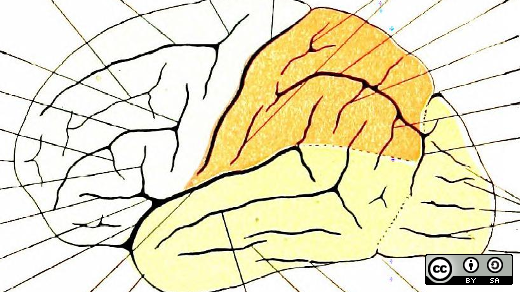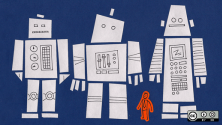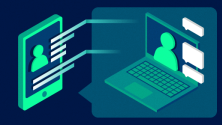Open source projects are helping drive artificial intelligence advancements, and we can expect to hear much more about how AI impacts our lives as the technologies mature. Have you considered how AI is changing the world around you already? Let's take a look at our increasingly artificially enhanced universe and consider the bold predictions about our AI-influenced future.
1. AI influences your purchasing decisions
A recent story on VentureBeat, "How AI will help us decipher millennials," caught my eye. I confess that I haven't given much thought to artificial intelligence—nor have I had a hard time deciphering millennials—so I was curious to learn more. As it turns out, the headline was a bit misleading; "How to sell to millennials" would have been a more accurate title.
According to the article, the millennial generation is a "the demographic segment so coveted that marketing managers from all over the globe are fighting over them." By analyzing online behavior—be it shopping, social media, or other activities—machine learning can help predict behavioral patterns, which can then turn into targeted advertising. The article goes on to explain how the Internet of Things and social media platforms can be mined for data points. "Using machine learning to mine social media data allows companies to determine how millennials talk about its products, what their sentiments are towards a product category, how they respond to competitors’ advertising campaigns, and a multitude of other data that can be used to design targeted advertising campaigns," the article explains. That AI and millennials are the future of marketing is no huge surprise, but Gen Xers and Baby Boomers, you're not off the hook yet.
AI is being used to target entire groups—including cities—of people based on behavior changes. For example, an article on Raconteur, "How AI will change buyer behaviour," explains that the biggest strength of AI in the online retail industry is its ability to adapt quickly to fluid situations that change customer behavior. Abhinav Aggarwal, chief executive of artificial intelligence startup Fluid AI, says that his company's software was being used by a client to predict customer behavior, and the system noticed a change during a snow storm. "Users who would typically ignore the e-mails or in-app notifications sent in the middle of the day were now opening them as they were stuck at home without much to do. Within an hour the AI system adapted to the new situation and started sending more promotional material during working hours," he explains.AI is changing how, why, and when we spend money, but how is it changing the way we earn our paychecks?
2. AI is changing how we work
A recent Fast Company article, "This is how AI will change your work in 2017," says that job seekers will benefit from artificial intelligence. The author explains that AI will be used to send job seekers alerts for relevant job openings, in addition to updates on salary trends, when you're due for a promotion, and the likelihood that you'll get one.
Artificial intelligence also will be used by companies to help on-board new talent. "Many new hires get a ton of information during their first couple of days on the job, much of which won't get retained," the article explains. Instead, a bot could "drip information" to a new employee over time as it becomes more relevant.
On Inc., "Businesses Beyond Bias: How AI Will Reshape Hiring Practices" looks at how SAP SuccessFactors, a talent management solutions provider, leverages AI as a job description "bias checker" and to check for bias in employee compensation.
Deloitte's 2017 Human Capital Trends Report indicates that AI is motivating organizations to restructure. Fast Company's article "How AI is changing the way companies are organized" examines the report, which was based on surveys with more than 10,000 HR and business leaders around the world. "Instead of hiring the most qualified person for a specific task, many companies are now putting greater emphasis on cultural fit and adaptability, knowing that individual roles will have to evolve along with the implementation of AI," the article explains. To adapt to changing technologies, organizations are also moving away from top-down structures and to multidisciplinary teams, the article says.
3. AI is transforming education
Education budgets are shrinking, whereas classroom sizes are growing, so leveraging technological advancements can help improve the productivity and efficiency of the education system, and play a role in improving the quality and affordability of education, according to an article on VentureBeat. "How AI will transform education in 2017" says that this year we'll see AI grading students' written answers, bots answering students' questions, virtual personal assistants tutoring students, and more. "AI will benefit all the stakeholders of the education ecosystem," the article explains. "Students would be able to learn better with instant feedback and guidance, teachers would get rich learning analytics and insights to personalize instruction, parents would see improved career prospects for their children at a reduced cost, schools would be able to scale high-quality education, and governments would be able to provide affordable education to all."4. AI is reshaping healthcare
A February 2017 article on CB Insights rounded up 106 artificial intelligence startups in healthcare, and many of those raised their first equity funding round within the past couple of years. "19 out of the 24 companies under imaging and diagnostics raised their first equity funding round since January 2015," the article says. Other companies on the list include those working on AI for remote patient monitoring, drug discovery, and oncology.
An article published on March 16 on TechCrunch that looks at how AI advances are reshaping healthcare explains, "Once a better understanding of human DNA is established, there is an opportunity to go one step further and provide personalized insights to individuals based on their idiosyncratic biological dispositions. This trend is indicative of a new era of 'personalized genetics,' whereby individuals are able to take full control of their health through access to unprecedented information about their own bodies."
The article goes on to explain that AI and machine learning are lowering the cost and time to discover new drugs. Thanks in part to extensive testing, new drugs can take more than 12 years to enter the market. "ML algorithms can allow computers to 'learn' how to make predictions based on the data they have previously processed or choose (and in some cases, even conduct) what experiments need to be done. Similar types of algorithms also can be used to predict the side effects of specific chemical compounds on humans, speeding up approvals," the article says. In 2015, the article notes, a San Francisco-based startup, Atomwise, completed analysis on two new drugs to reduce Ebola infectivity within one day, instead of taking years.
Another startup, London-based BenevolentAI, is harnessing AI to look for patterns in scientific literature. "Recently, the company identified two potential chemical compounds that may work on Alzheimer’s, attracting the attention of pharmaceutical companies," the article says.In addition to drug discovery, AI is helping with discovering, diagnosing, and managing new diseases. The TechCrunch article explains that, historically, illnesses are diagnosed based on symptoms displayed, but AI is being used to detect disease signatures in the blood, and to develop treatment plans using deep learning insights from analyzing billions of clinical cases. "IBM's Watson is working with Memorial Sloan Kettering in New York to digest reams of data on cancer patients and treatments used over decades to present and suggest treatment options to doctors in dealing with unique cancer cases," the article says.
5. AI is changing our love lives
More than 50-million active users across 195 countries swipe through potential mates with Tinder, a dating app launched in 2012. In a Forbes Interview podcast, Tinder founder and chairman Sean Rad spoke with Steven Bertoni about how artificial intelligence is changing the dating game. In an article about the interview, Bertoni quotes Rad, who says, "There might be a moment when Tinder is just so good at predicting the few people that you're interested in, and Tinder might do a lot of the leg work in organizing a date, right?" So instead of presenting users with potential partners, the app would make a suggestion for a nearby partner and take it a step further, coordinate schedules, and set up a date.
Are you in love with AI yet? Future generations literally might fall in love with artificial intelligence. An article by Raya Bidshahri on Singularity Hub, "How AI will redefine love," says that in a few decades we might be arguing that love is not limited by biology.
"Our technology, powered by Moore's law, is growing at a staggering rate—intelligent devices are becoming more and more integrated to our lives," Bidshahri explains, adding, "Futurist Ray Kurzweil predicts that we will have AI at a human level by 2029, and it will be a billion times more capable than humans by the 2040s. Many predict that one day we will merge with powerful machines, and we ourselves may become artificially intelligent." She argues that it's inevitable in such a world that humans would accept being in love with entirely non-biological beings.
That might sound a bit freaky, but falling in love with AI is a more optimistic outcome than a future in which robots take over the world. "Programming AI to have the capacity to feel love can allow us to create more compassionate AI and may be the very key to avoiding the AI apocalypse many fear," Bidshahri says.
This list of big ways AI is invading all areas of our lives barely scrapes the surface of the artificial intelligence bubbling up around us. Which AI innovations are most exciting—or troubling—to you? Let us know about them in the comments.







8 Comments